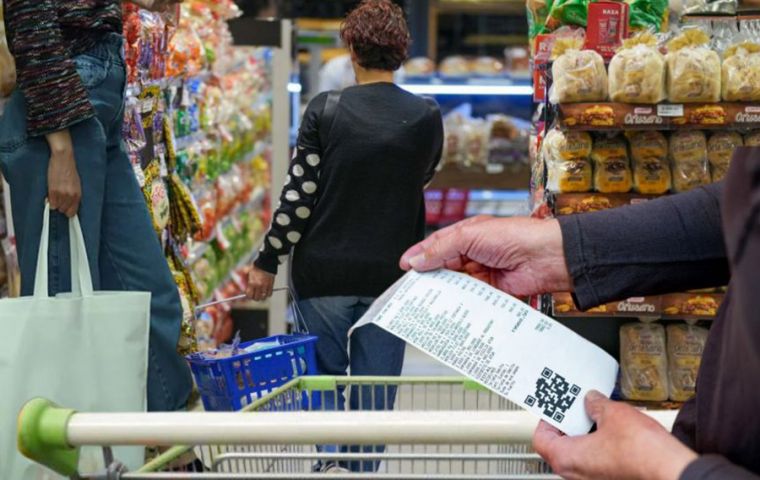MercoPress. South Atlantic News Agency
Indec announces Argentina's inflation in 2024 reached 117.8%
 December's It was the lowest monthly rate since July 2020 amid strict Covid-19 lockdowns, when inflation reached 1.9%
December's It was the lowest monthly rate since July 2020 amid strict Covid-19 lockdowns, when inflation reached 1.9% Argentina's Consumer Price Index (CPI) went up 2.7% in December 2024 for an accumulated 117.8% last year, the National Institute of Statistics and Census (Indec) said Tuesday in a report released in Buenos Aires. It was the lowest monthly rate since July 2020 amid strict Covid-19 lockdowns, when inflation reached 1.9%.
The division with the highest increase last month were Housing, water, electricity, gas, and other fuels (5.3%), due to increases in Housing rent and related expenses and Electricity, Gas, and other utilities. Right behind came Communication (+5%), due to adjustments in Telephone and internet services.
Overall, the divisions with the highest increases were Food and non-alcoholic beverages (+2.2%) in five regions, due to increases in Meat and derivatives, Bread, cereals, milk, other dairy products, and eggs; while in in the Greater Buenos Aires Area, the highest increases were recorded in Restaurants and hotels (4.6%).
The lowest variations in December were in Clothing and footwear (1.6%) and Household equipment and maintenance (0.9%). Regulated CPI increased by 3.4%, followed by Core CPI (3.2%), while Seasonal CPI fell by 1.4%.
The Libertarian Government expected last month's figure below 3%. After knowing the data, Economy Minister Luis Toto Caputo wrote in his X account: “The National CPI registered a variation of 2.7% in December, confirming the continuity of the disinflation process.”
In the meantime, the new economic scenario keeps surprising Argentine travelers who find Brazil highly affordable. According to the @ComunidadFloripa Instagram account, an asado for six people in Florianópolis costs R$62.59 (around AR$32,355.4) while the same menu in Argentina would stand well over AR$60,000.
Given the new conditions, Argentina's Central Bank (BCRA) will starting in February adjust the monthly devaluation rate of the Argentine peso against the US dollar to 1 from its current 2%.
”In consideration of the consolidation observed in the inflationary trajectory during the last months, and in the expectations of lower inflation, the Central Bank of the Argentine Republic (BCRA) establishes a new displacement path of 1% per month for the exchange rate, starting on February 1, 2025,″ the BCRA said in a statement.
This measure is adopted “in a context of recovery of economic activity and a seasonal increase in prices, both inflation in recent months and high-frequency observations”, which confirms “an inflation observed downward and below the expectations surveyed in the market.”
The exchange rate twitch “continues to play the role of a complementary anchor in inflation expectations,” the BCRA explained.




Top Comments
Disclaimer & comment rulesCommenting for this story is now closed.
If you have a Facebook account, become a fan and comment on our Facebook Page!